
 |
|
|
Please write: dan@dancooper.tv
Return to Page One
Register here to receive Fashion Finds
email updates!

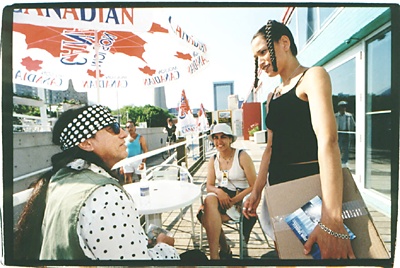 |
Lucie Idlout: You know, I have to be honest enough to say that those are the things that I write and sing about. But I really hate focusing on those issues relative to the community, because there are so many beautiful things that are going on here. But yeah, those issues need to be talked about, yeah, they need to be dealt with amongst ourselves. But relative to the rest of the world you know. We’re happy Inuit in our territory who are just living our lives.
FF: So you don’t feel that these issues should be so politicized.
Lucie Idlout: No, I don’t like that they are. And I also try not to allow people to highlight the fact that I’m Inuit, because I’m a singer/songwriter. I’m a musician, and that’s what I am. I’m Lucie Idlout, yes, first and foremost. I don’t deny the fact that I’m Inuit. I love the fact that I’m Inuit -- I’m proud of my people. I can’t deny that it’s a part of who I am. I think that’s just something that comes through. But if you have a Spanish person, or an African-American person, or whoever out there doing their art, they’re not necessarily doing that to represent their culture; they’re doing it for the love of art, right?
FF: But some of their vision, of course, is the influence of the environment they grew up in, their cultural environment. So you feel that these negative issues, which I agree are constantly put out front, and in a sense should be addressed, should be more personal, or more private.
Lucie Idlout: Absolutely. Yeah, yeah. And anywhere you go in the world, the issues exist. Like it doesn’t matter what community you go to. They’re there.
But because we’re always getting so much
really negative press about how our communities are, how are people are, you know, social
issues and blah, blah like it just goes on and on. And life here can be hard at times,
yeah. But I don’t think it’s any different than anywhere else in the world. And
it really depends on the people that you surround yourself with.
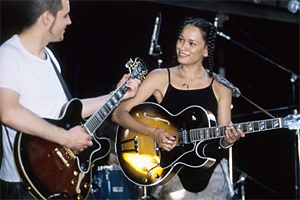 |
FF: You know, I live in New York City, where there are plenty of people who are extremely privileged, and have everything quote/unquote they want in the world. And they’re completely …
Lucie Idlout: ... no less dysfunctional.
FF: Right. They may even be more so. So it doesn’t really make any difference. And so tell me a little bit about the last five years, and what you’ve been doing. The progress in your art and just your day to day life.
Lucie Idlout: Well, when I first came up here, I was a mess. I had a lot of things that were going on that needed to be worked through. And I started working through those things through music, and it was a real healing process more than anything.
And I wasn’t writing so that I could have a repertoire of music at all. And actually I wasn’t even writing them as songs; they were starting off as pieces of poetry. And as a matter of fact I happen to know some guitar chords and just started putting the two together.
FF: And when you say a mess, do you mean emotionally you felt wrung out, or was it a physical feeling ...
Lucie Idlout: Well actually, you know, in a sense I was almost like detached from the fact that anything was going on. I thought everything was just fine, to tell you the truth. But I was partying too much and sort of not facing the real world; not making a huge effort to make any sort of impact.
Like I just lost that drive to want to save the
world. That was -- that was gone.
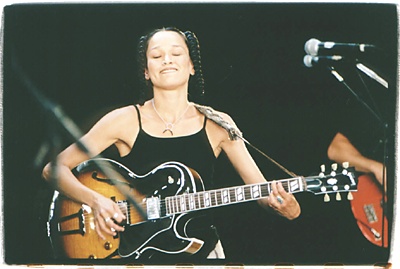 |
FF: And was there one distinct moment where you realized like, hey I’m a mess, and hey I’ve got to work through things, or was it a slower progression of just writing poetry and song and working through it that way?
Lucie Idlout: Well, I think initially you know it started becoming a known fact to me when people were saying, hey like your songs are really dark. Why are you writing about suicide? What’s going on? Are you okay?
FF: They were all worried about you.
Lucie Idlout: Well, yeah in a sense, and it made me think, you know, what’s wrong with you -- why aren’t you thinking about these things. Like why aren’t you worried about who’s committing suicide, and why haven’t you noticed that there are things going on around you; like why don’t you see that? You know, I don’t think I was necessarily open to the fact that these were my issues.
FF: Right, right.
Lucie Idlout: And then when I went off the theater school, one of the really big components there was made of spirituality. And praying to the Creator, and always acknowledging your ancestors and all your relations and just all that stuff.
And through that, and through learning how to drop into character and be in touch with those characters that are within you that you can bring out to make a character come alive, I started coming up against these boundaries, these issues started coming up.
I think it was through that -- that in itself was a huge healing process; just learning how to be an actor put me in a situation where I had to be absolutely honest with myself. And I was living in reality like big time. If you were at the theater school and you got caught drinking, you were automatically kicked out you know; I was never in a situation where I could drink, not that I had a huge drinking problem.
But we were surrounded by wholesome goodness you
know, out in the country, eating good food three times a day. Sleeping well every single
night. Sitting by the campfire watching the moon come up.
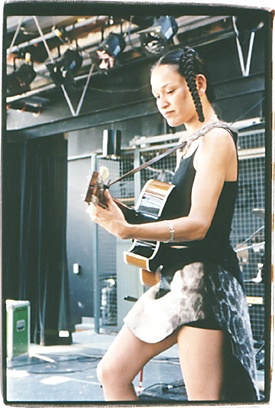 |
FF: And is it still the case that you perform in sealskins?
Lucie Idlout: Yup. The only times that I don’t perform in sealskins is if I’m playing to a majority like Inuit audience, or rather I should say the times that I do insist on performing in sealskin is to a southern audience.
But I won’t take my sealskin out of the country.
FF: So when you travel overseas or in the States, you perform in whatever outfit ...
Lucie Idlout: Civilian clothing.
FF: And so tell me more about what the meaning of that is for you.
Lucie Idlout: Well basically you know, back in the Fifties the fur industry used to be a huge source of income for Inuit. And it wasn’t just sealskin, you know. It was fox fur, it was like every kind of fur out there; wolf pelts, everything. And like some of the best fur comes from up here.
And then, all of that just one day just like the whole industry just crashed, and people didn’t want our skins any more, because nobody had any money left, and at that point Inuit were already living in houses and used to some of the nicer things that have come from the south, like tea and flour and you know whatever else. But nobody had incomes any more to be able to buy all that stuff. Or didn’t have the same types of income that they used to have.
And my grandfather actually by Inuit standards was quite a rich man from the fur industry. But over time it’s gone from a point of not being able to afford furs to it being an animal rights issue.
FF: Yes. So it never came back ...
Lucie Idlout: Right. It never really came back. And particularly with sealskin. In the States like there’s a fur ban on sealskin.
And there’s a few other countries that have signed the same treaty or whatever. But you know, it’s because I think the average anti-sealskin or anti-fur animal rights activist group has this image of this little baby seal with a white coat being clubbed over the head by some big badass hunter.
And that’s really not what it’s about. That’s not what the sealskin industry is about at all. And that’s not what Inuit are about when it comes to seals.
FF: Right.
Lucie Idlout: Seals are still one of the major sources of diet in a traditional family, or in a traditional home. That’s right. And when one goes out and catches a seal, it’s not for the coat; it’s actually for the meat, and for the entire animal. And the coat as well. The fur is used -- and still used for clothing. Sealskin is still a major part of the warm clothing that you need to be able to go out hunting, or even sealskin boots, which I have a few pairs of. Just to go out boogying around in the wintertime. Keep your feet warm, you know.
So there’s that. And I’m not some white girl walking around down south in a coat because I’ve got too much money.
FF: Right.
Lucie Idlout: So there’s that component as well.
FF: Maybe you’ve got balls like P.J. Harvey
too, right?
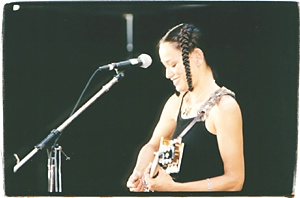 |